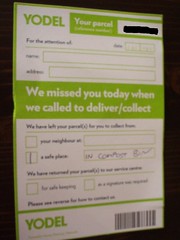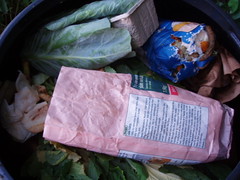So, I got this delivery note through the door recently.
Description: A standard "we missed you" delivery note from Yodel (formerly Home Delivery Network). Most of the fields are unfilled, except for one row reading (handwritten part italicised): "1 [package in] a safe space in compost bin"
For reference, compost bins are almost the antithesis of a safe place to store organic matter such as the cardboard and paper that packages are made from.
For further reference, a photo of the interior of the compost bin.
Description: The inside of our compost bin. A large slug is in the top-right, chewing on an old flour bag which is significantly damaged after only a couple of days. Further down, and somewhat hard to make out on this photo, is a colony of woodlice.
The pink flour bag in the centre of the picture is in approximately the position that the package was retrieved from.
Obviously my instinctive reaction, having retrieved the package and brushed off two slugs and some sort of beetle, was to wonder how anyone could be so unthinking as to come to the conclusion that a compost bin - which they had recognised as such - was a safe place to store post.
Having thought about it a bit more, though, the real answer is probably that it would be commercially less competitive to do anything else.
- Courier firms are selected by the sender, not the recipient. The sender is going to prefer cheaper couriers for the same nominal level of service.
- Provided the courier doesn't lose or destroy the post too often, the cost of providing refunds and replacements to customers when they do may well not exceed the saving from using a cheap courier to start with.
- Courier firms therefore have an incredibly strong incentive to cut costs.
- Travelling to the same destination more than one for the same parcel is inefficient - if the parcel can be "delivered" first time, this saves costs on fuel, staff time, and elsewhere.
Therefore, it makes sense to instruct staff, as a matter of company policy, that a compost bin makes a usable safe space if nothing better can be found. (Probably not in those exact words, though)
The fact that the recipient will feel they've received bad service is beside the point - they're not paying for the service, and the fact that they're paying someone else to pay for the service is too indirect for the market.

